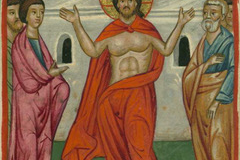Scottish cardinal voices concern over gay adoption proposals
In a hard hitting commentary article in yesterday's Sunday Times, Cardinal Keith O'Brien has questioned the Scottish executive's current adoption consultation and the proposal to allow unmarried and same sex couples to adopt. The Cardinal described such a move as: "gravely immoral" and warned that: " Scotland's adopted children must not become guinea pigs in some distorted social experiment aimed at redefining marriage, subverting the family and threatening the good of society. Denying them the benefits of a mother and a father in a committed marriage will cause great harm to a weak and vulnerable minority we should strive to protect." The full text of the article follows: Four years ago the Scottish Executive launched a review of the adoption system. In June an expert group produced a report containing over 100 recommendations and suggestions for improvement. The majority are reasonable and sensible. Some however, including proposals to allow joint adoption by unmarried couples including same-sex couples are highly questionable. The Executive supports the majority of the recommendations including those on unmarried and same-sex couples and has launched a consultation, inviting responses by 31 October. The proposals aimed at addressing and improving adoption will rightly be analysed by professionals in the field including Catholic adoption agencies who will comment in detail. For most people however this will be another exercise by experts for experts, unlikely to receive the wider attention it deserves. There is no doubt that the current system fails to meet children's needs. According to official figures, adoption applications in the last twenty years have fallen from 1,000 a year to less than 400, while 6,500 children are in the care of local authorities; in residential homes or with carers. Many are in care for long periods, denied the stability and security their peers take for granted. Sadly, these statistics highlight a growing insularity within our society an unwillingness on the part of couples and families to look beyond the boundaries of their own settled lives and ask 'what can I give to society?' Many answer the call to public-spirited action in other areas; as blood donors or members of children's panels. Perhaps it is time to remind families of the enormous benefits they could provide for vulnerable children by adopting. To Scotland's 250,000 Catholic families and to the thousands of Catholic couples married in our churches every year I send a plea: consider sharing the love and stability which I hope fills your homes with a child who has little or no experience of either. To all Christians and people of goodwill I ask; consider these words from St. Matthew's gospel; "I was hungry and you gave me something to eat, I was thirsty and you gave me something to drink, I was a stranger nd you invited me in, I needed clothes and you clothed me, I was sick and you looked after me, I was in prison and you came to visit me." Accepting these words means acting to meet the needs of others, always remembering God's promise; "whatever you did for one of the least of these brothers of mine, you did for me." Were more families to consider adopting, there would be no need to widen the definition of suitable adopters. The proposal to extend joint adoption to unmarried and same sex couples is at least in part based on the report group's view, that it "could make a contribution to extending the potential pool of adoptive families." I cannot understand this view. A mass of evidence, attests to the instability of unmarried relationships and the chronic instability of same sex partnerships yet worryingly our "experts" ignore it. Since unmarried couples have opted not to legally entrench their relationship in any recognisably permanent way, why assume that the entrenched permanence of adoption would appeal to them? Similarly, since less than two percent of the population is homosexual and a minority of this group are in 'stable' relationships, very few might consider adopting. It's difficult to see how the changes advocated can have any meaningful impact on the "the potential pool of adoptive families." Even if the proposed changes were to result in a greater number of couples considering adoption very careful consideration would have to be given to the implications of allowing them to adopt. Unmarried and same sex relationships can reasonably be described as existing on a sliding scale of instability. Only 7% of adults are in cohabiting relationships, while 60% go on to marry 40% dissolve within ten years, the median length of such relationships being three years. The instability inherent in homosexual relationships is even more marked. In Norway and Sweden, one study found that the rate of breakdown in same-sex relationships was far higher than in marriages. In Sweden, where the rate of divorce is already high homosexual males were 1.5 times more likely to split, while lesbian couples were 2.67 times as likely to break up. This is to say nothing of the widely documented promiscuity, which accompanies the homosexual lifestyle. Ostensibly, it is the 'needs of children', which Scottish ministers claim are paramount. Accordingly, it is difficult to understand why anyone would consider placing children in an environment that is not conducive to their full human development and is gravely immoral. Earlier this year, the Rev David Lacy, Moderator of the General Assembly of the Church of Scotland publicly opposed homosexual adoption, and called on politicians to back policies promoting marriage, I endorse his intervention. We ignore a wealth of global evidence and place innumerable children in peril if we forget certain immutable human truths; children need a male and a female role model in a permanent relationship. Marriage alone at all times and in virtually all cultures can claim to have provided this. Ministers insist that nothing in these proposals undermines marriage yet advocate the removal of incentives to marriage such as the need for adoptive parents to be married! Aside from the dangers of introducing children familiar with instability into situations likely to become unstable they may also suffer long-term behavioural change. Many studies have looked into the significant differences between homosexual and heterosexual parenting outcomes for children, particularly the likelihood that these children may become involved in homosexual behaviour. Sociologist Patricia Morgan has written the largest review of the research ever published in Europe. Her book, Children as trophies, considers 144 academic papers including 50 on same-sex parenting. She has concluded: "If public policy is based on clear research, there is no case for changing the adoption law to allow same-sex couples or unmarried couples to be able to adopt children." A report for the Spanish Forum for the Family and the Institute for Family Policy concluded that the majority of studies, in favour of same-sex parenthood, betrayed an egregious lack of scientific rigour. Among children raised by same-sex couples, a significant increase in low self-esteem, stress, confusion regarding sexual identity, increased mental illness, drug use, promiscuity, STI's, and homosexual behaviour was recorded. It is interesting to note that in Denmark which has had same sex civil partnerships for sixteen years, homosexual couples are not allowed to adopt, in Sweden only a limited entitlement to adopt exists, where one of the same sex partners is the birth parent, while France and Germany do not give homosexuals adoption rights. The Executive's document accepts "there are no reliable studies of same sex adoption." Most are largely concerned with same sex parenting of children born in heterosexual relationships that have broken down and "do not point to any consensus". The document concedes, "the studies do seem to indicate some differences in the behaviour and attitudes of children raised in families headed by gays and lesbians." Yet it concludes by asserting, "there is no strong evidence which suggests that gays and lesbians should be excluded from consideration for adoption." This is a staggeringly untenable conclusion. If as the report acknowledges, the available research is inconclusive, then a cautionary approach would be wise. Scotland's adopted children must not become guinea pigs in some distorted social experiment aimed at redefining marriage, subverting the family and threatening the good of society. Denying them the benefits of a mother and a father in a committed marriage will cause great harm to a weak and vulnerable minority we should strive to protect.


















